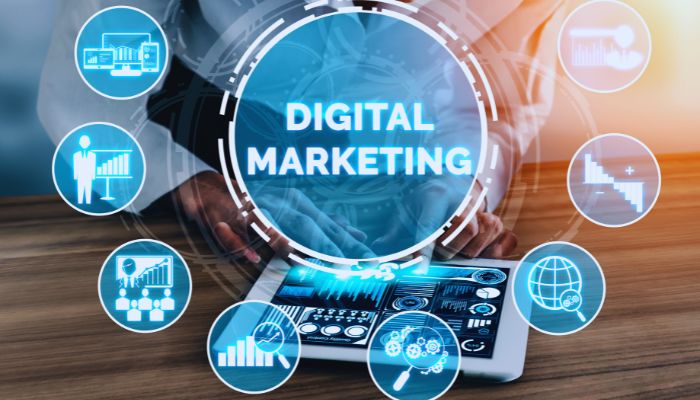Digital marketing, also called online marketing, involves promoting products or services through digital channels, such as search engines, social media platforms, and websites. This shift from traditional marketing methods to online channels allows brands to leverage a broad range of digital tactics, including search engine marketing, social media marketing, email marketing, and video marketing, to engage both current and prospective customers.
As digital marketing becomes more critical, its accessibility and effectiveness have led to rapid adoption across industries, from small businesses to larger companies. This digital strategy allows businesses to reach a vast target audience, enhance brand visibility, and increase brand awareness in ways that traditional marketing cannot match.
2. Why Digital Marketing is Essential for Businesses Today
Digital marketing opens doors to new customers, drives business growth, and establishes a brand’s presence online. Businesses can utilize various digital marketing channels to create a comprehensive online marketing strategy that reaches potential customers through multiple channels. Here’s why digital marketing is vital for businesses:
Reaching a Wider Audience
Digital marketing strategies enable businesses to reach a broader audience compared to traditional marketing. With numerous digital marketing tactics, including display advertising, social media advertising, and influencer marketing, brands can connect with specific demographics based on age, interests, location, and behavior.
Through social media channels, digital marketers can engage users on platforms they frequently use, such as Facebook, Instagram, and Twitter. These channels provide direct access to both current and prospective customers, allowing for targeted campaigns that drive engagement and loyalty.
Engaging with Customers in Real-Time
Digital marketing lets businesses interact with customers in real-time, responding to comments, messages, and feedback. This engagement not only builds trust but also fosters customer loyalty. Social media posts, blog posts, and video content allow brands to share updates, answer questions, and address concerns quickly. The ability to engage with customers in real-time sets digital marketing apart from traditional methods, which lack this immediacy.
Enhancing Brand Awareness and Visibility
Building brand awareness is one of the most important benefits of digital marketing. Through digital channels, businesses can use strategies like social media advertising, influencer partnerships, and search engine optimization to increase their visibility. By appearing on search engine results pages and within social media feeds, brands can reach a larger audience and make a lasting impression.
For businesses that prioritize growth, digital marketing efforts can build a robust online presence. For instance, a digital marketing campaign that combines SEO with social media and content marketing can drive organic traffic to a brand’s website, amplifying reach and credibility. Through this integrated approach, brands can achieve a level of visibility that might be difficult to achieve with traditional marketing alone.
3. Cost-Effectiveness and ROI in Digital Marketing
One reason digital marketing is so popular is its cost-effective nature. Unlike traditional marketing channels like TV and print, which can be costly, digital advertising allows businesses to allocate their budgets based on specific business objectives. For instance, social media marketing and email marketing campaigns can be highly targeted, ensuring that marketing dollars are spent on reaching the right people.
With digital marketing, businesses can track metrics like engagement, clicks, and conversions, giving digital marketers the data needed to measure the return on investment (ROI) of each campaign. This transparency enables continuous improvement and adjustment of marketing strategies to align with business goals. The ability to analyze results and adapt quickly makes digital marketing a more efficient and flexible approach, especially for small businesses and startups.

4. Targeting and Personalization
Digital marketing channels allow businesses to reach specific audience segments and tailor messages to meet their needs and preferences. This level of targeting and personalization is rarely possible in traditional marketing. Digital marketers can create personalized content strategies, design social media posts that appeal to niche groups, and run digital ads based on user behavior, location, and past interactions.
An effective digital marketing strategy often includes audience segmentation, ensuring that each message resonates with the intended audience. With tools like marketing automation, businesses can automate tasks like email campaigns and digital ads to personalize marketing efforts further, creating a customized experience that builds brand loyalty.
5. Building Long-Term Customer Relationships
Digital marketing is not just about attracting new customers—it’s also highly effective for building long-term relationships with existing ones. By using personalized and continuous interactions, businesses can foster customer loyalty and engagement. Email marketing, for instance, allows companies to keep customers updated with new offers, product launches, and relevant information. Through targeted email campaigns, brands can nurture relationships, reminding customers of their value and establishing ongoing brand loyalty.
Social media platforms also play a crucial role in maintaining relationships. Digital marketers can engage directly with their audience, respond to comments, and create a sense of community through regular social media posts and interactions. These engagements make customers feel valued and keep them connected to the brand, making digital marketing a key driver in sustaining customer loyalty over time.
6. The Role of Data in Digital Marketing
One of the major advantages of digital marketing channels is their ability to generate real-time data on audience behavior and campaign performance. By utilizing tools like Google Analytics, brands can track essential metrics such as website traffic, bounce rates, conversion rates, and engagement. This data is invaluable for digital marketers aiming to refine their strategies and ensure that their marketing efforts are aligned with specific business goals.
Data-driven decision-making is a defining feature of an effective digital marketing strategy. Insights gathered from various channels can reveal which digital marketing techniques resonate with audiences, allowing businesses to focus on the most effective tactics and continuously improve their approach. This capability gives brands a significant edge in optimizing their campaigns and achieving better results over time.
7. Adaptability and Flexibility in Digital Marketing
One of the unique advantages digital marketing offers over traditional marketing methods is its adaptability. Digital marketing channels, such as social media and email, allow for easy, real-time adjustments to campaigns. If a particular strategy isn’t yielding the expected results, digital marketers can pivot their approach, testing new formats, targeting options, or messaging.
This flexibility is particularly important in today’s rapidly changing market, where trends can shift quickly. The ability to test and optimize digital marketing tactics, such as digital ads or content strategies, in real-time helps businesses stay competitive. This adaptability ensures that marketing campaigns are not only timely but also responsive to audience feedback, making digital marketing an essential tool for businesses looking to remain agile.

8. Expanding Business Reach and Visibility
Digital marketing enables brands to expand their reach far beyond what traditional marketing could achieve. Through digital channels like social media, search engine optimization, and email marketing, businesses can connect with a global audience. Additionally, with tools like display advertising, influencer partnerships, and paid search ads, brands can target specific demographics, regions, or interests, making their reach both expansive and precise.
For instance, using a blend of video marketing, influencer marketing, and SEO, a digital marketing manager can create content that resonates across multiple platforms, reaching potential customers worldwide. By building visibility on search engine results pages, social media channels, and through online advertising, brands can extend their reach and enhance their overall online presence, driving consistent engagement.
9. Supporting Long-Term Brand Growth and Success
Ultimately, digital marketing is a powerful tool for fostering sustained growth and success. With numerous digital tactics and continuous opportunities for improvement, digital marketing helps brands meet both short-term and long-term business objectives. By creating cohesive, multi-channel campaigns that deliver consistent messaging across different platforms, businesses can build a unified brand identity that resonates with audiences.
Integrating multiple digital marketing tactics such as inbound marketing, content marketing, social media marketing, and SEO allows brands to create a well-rounded digital strategy that meets evolving customer expectations. This holistic approach to marketing fosters brand growth, customer loyalty, and ongoing engagement, all of which are essential for long-term success in today’s competitive landscape.




Ok
Thanks for sharing .